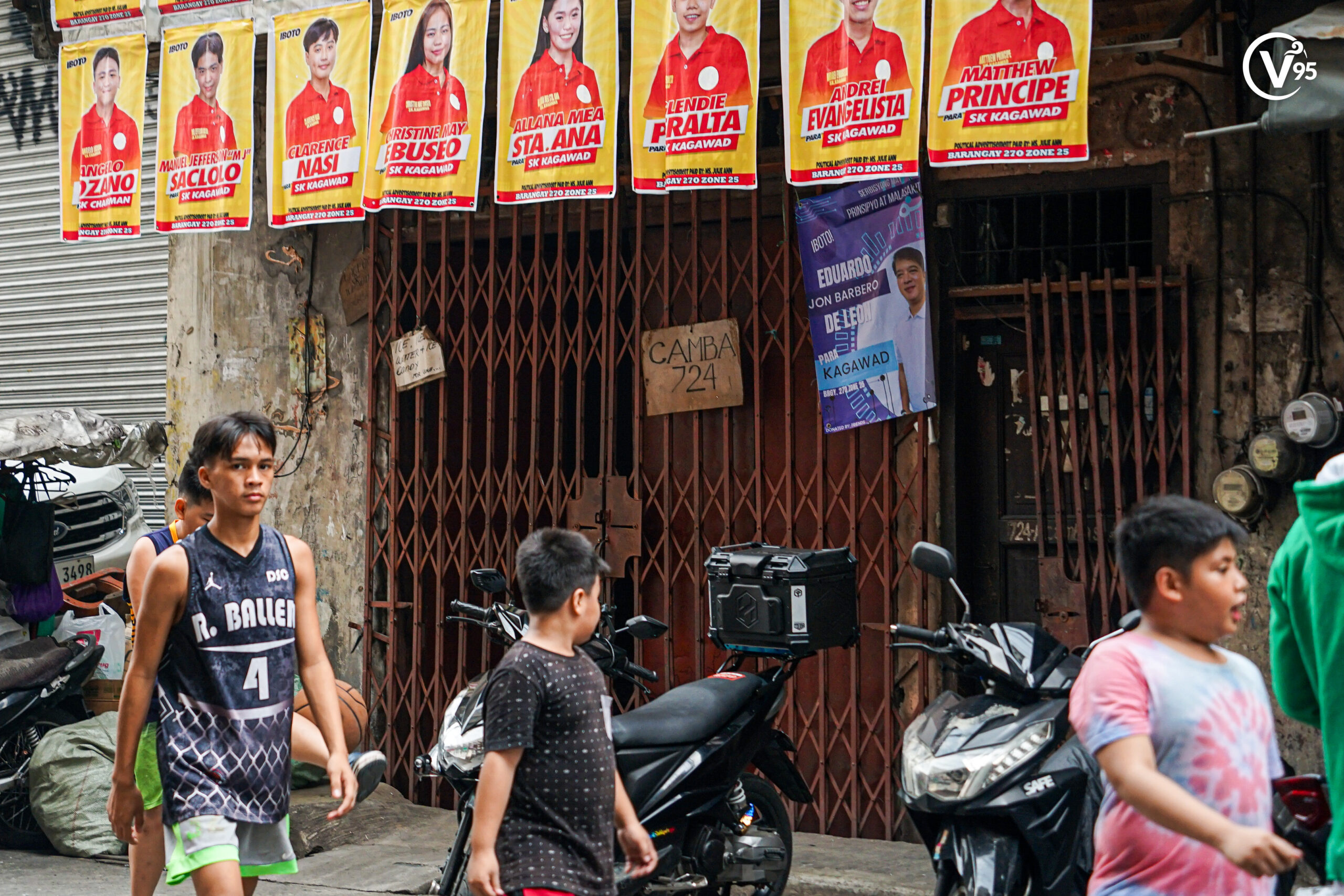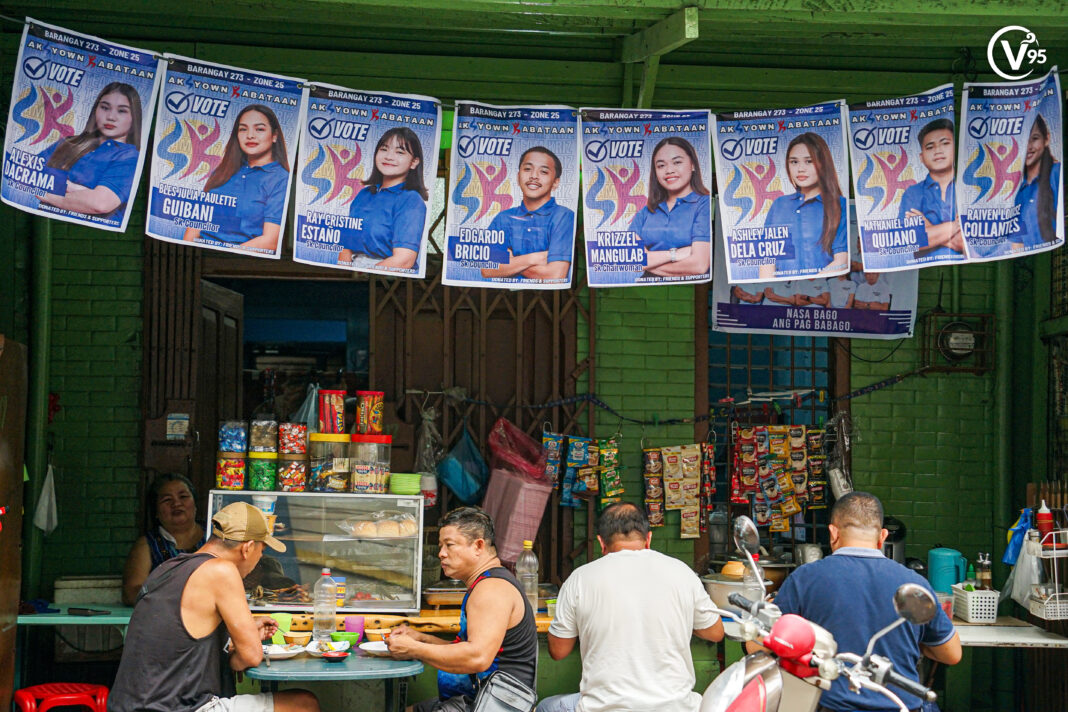Valerie Ferido, a second-year psychology major at the Far Eastern University (FEU), is frustrated that some candidates for Sangguniang Kabataan (SK) positions in Brgy. East Dirita, San Antonio, Zambales, remained inside their comfort zones throughout the campaign.
“The majority of their projects revolve around covered court renovations, sports leagues, and e-sports tournaments,” Ferido told the Varsitarian. “While it does, in a way, keep the youth active, it all feels underwhelming, especially when you know that these leaders can do so much better.”
She was also saddened by how resumés of some aspirants included unnecessary credentials like “quiz bee participant” and “poster-making champion.”
For Daniel Permites, a political science senior at UST, the platforms of some SK aspirants in his hometown of Puerto Princesa, Palawan, are glaring with “vagueness.”
“I usually see a common pattern with the use of pleasant keywords in a platform such as ‘empower,’ ‘transparency,’ ‘generate,’ and many others, which are typically associated with various issues,” he told the Varsitarian.
As the electorate prepares to choose a new set of grassroots leaders for the first time in five years, political scientists are urging young voters to pick “innovative” SK candidates who can go beyond cliché platforms.
“Go beyond beauty pageants and basketball courts,” Assoc. Prof. Reynold Agnes, a faculty member at the FEU Department of Political Science, told the Varsitarian. “That’s why I said to [find] a way to give [SK] more powers beyond resolution-making. Innovative leader – ito ‘yong function, your ability to interpret beyond what is usually practiced by SK.”
Mae Angelie Salvador-Garcia, a political science instructor at the University of Northern Philippines in Ilocos Sur, said that aside from advocacies, voters must judge the level of knowledge that SK candidates possess in administrative work, where the formalities of governance take place.
“They [should] have the knowledge on how to make letters, on how to make correspondences,” she told the Varsitarian. “Voters have to see to it that the person they are voting for is maaasahan […] when they need something. Hindi ‘yong […] magsa-smile lang kapag campaign period.”
John Chester Martinez, a political science sophomore at UST who runs as SK councilor at Brgy. San Isidro, Antipolo City, said many aspirants have genuine causes that prompted them to hop into the race. In his case, he wants to focus on reproductive health if elected.
“[H]indi lang sila tutugon doon sa paliga, tumutugon sila sa problema na kinakaharap ng kabataan kagaya ng sa health, mga nagkakaroon ng HIV, nakararanas ng early pregnancy, at mga kabataang maagang nagtatrabaho imbes na nag-aaral,” he told the Varsitarian.
“Yes, meron tayong government na puwedeng tumugon doon […] pero ‘yong SK kasi, mas alam nila kung paano tutulong at mas alam nila ‘yong dala-dala ng mga kabataan.”
Martinez is one of more than 585,000 political novices who have filed candidacies for SK positions in over 42,000 barangays, according to the Commission on Elections (Comelec), a 34-percent increase from 2018.
Abolishing SK?
One problem hounding SK is the presence of traditional politicians teaching “dirty tricks” to susceptible young leaders.
“When the traditional politicians penetrate the system, it destroys the system a lot. So in that case, nagiging negative ang SK,” Agnes said.
For instance, in Iligan City, some SK officials in 2013 were caught embezzling funds, padding their payrolls, listing up ghost employees, overpricing items and forging signatures, according to a study titled “Corruption Practices Among Young Elective Public Officials (Sanggunian Kabataan) In Iligan City, Southern Philippines,” authored by students of Mindanao State University – Iligan Institute of Technology.
Involved officials told the researchers that corrupting the people’s money was a workaround to “save” their organization from a meager budget and delayed disbursements.
“The bureaucratic delays and legal restrictions forced the SK officers to find viable but illegitimate means to operate under limited resources and difficult circumstances,” part of the study read. “The integrity and accountability of the young public officials are adversely affected because of the organizational loopholes and structures that promote the practice of graft and corruption in the barangay local government unit.”
The youth council has also become another outlet for partisanship, as traditional politicians cultivate alliances with young leaders for personal gain, said Assoc. Prof. Reymund Flores, who teaches at the Department of Social Sciences of West Visayas State University in Iloilo City.
“We cannot deny the fact that there are many instances [in which] SK is used as an extension of political control at the barangay level,” he told the Varsitarian. “The law says barangay officials, including SK, are not and should not be partisan, but, in practice, it is not.”

Garcia said she has students aspiring to run for office but were discouraged because some politicians already have preferred bets.
“[S]ome of the youth that is entering SK are being manipulated by higher positions or higher individuals that are holding a particular position in the government,” she said.
Former House Speaker Pantaleon Alvarez has sought the abolition of SK, arguing in a 2016 interview that officials “are getting paid without doing anything.”
“We might as well get rid of it because all sectors are represented in Congress anyway. In fact, we have a party-list representative for the youth in Congress,” he said.
The call, however, went nowhere.
Reforms
Flores opposes removing SK because the youth would be deprived of representation at the grassroots level.
“What we need is a Sangguniang Kabataan that is sensitive and responsive to the ever-changing social and developmental needs of the Filipino youth,” he said.
In 2016, the late president Benigno Aquino III signed Republic Act 10742 instituting significant reforms within the SK system, which include extending the eligible age of candidates to 24, mandating officials to attend leadership trainings, prohibiting political dynasties and establishing the Local Youth Development Council to support young leaders.
“If we consider SK reforms as the way to reset, restart, or refresh the system, then all other actors, both formal and informal, interest groups and subsectors had more likely seen this as a chance to also reset and reactivate,” Flores said.
Garcia is encouraged that despite the issues plaguing SK, the high number of candidates this year shows the youth remains interested in maintaining a “strong republic.”
“One of the reasons why very eager sila mag-join in SK is that they aspire for change,” she said. “We can see in social media the dissatisfaction of the youth of what is happening right now. So they want to aspire for change; they want to become a catalyst for change.”
The polls will open on Monday, Oct. 30, from 7 a.m. to 3 p.m. Voters aged 15 to 17 will receive one ballot for SK. Those between 18 and 30 are eligible to vote both for SK and barangay. Filipinos who are 31 years old and above can only vote for barangay. With reports from Ralent M. Penilla

















